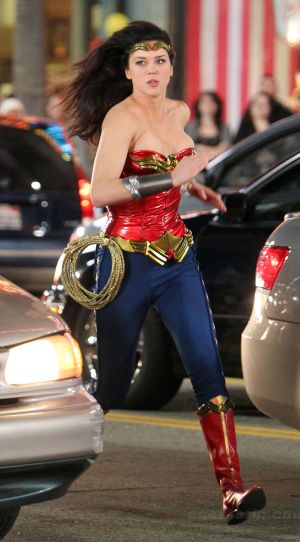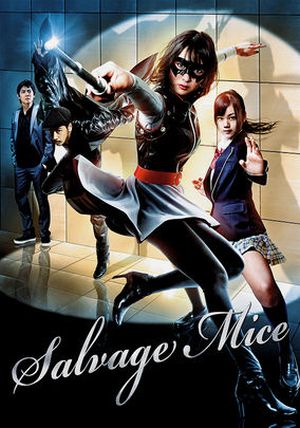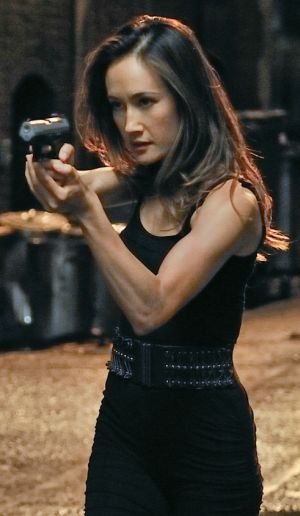★★★
“Nowhere near as bad as you might think.”
 Allowing for the fact this was more or less a rough-cut – you can still see the wires as the heroine throws villains around – this actually is far from the atrocity you expect, going from the pre-production fan loathing. The story avoid the whole “origins” thing, hitting the ground running by having Wonder Woman/Diana Prince (Palicki) already fully-active, and busting crime around Los Angeles. Her extra-legal activities, with the local cops’ complicity, bring her to the attention of the federal authorities. Meanwhile, she’s tussling with the board of her company over the merchandise that funds her crime-fighting, objecting to the size of the tits on her action-figure – and, yes, they actually say “tits”, to my surprise. Finally, the villainess (Hurley) is performing illegal medical experiments with steroids and such, to create super-soldiers, and it’s up to Wonder Woman, her plane (wisely, no longer invisible), bullet-deflecting bracelets and lasso which may or may not be of truth (it’s unclear from this episode) to stop her.
Allowing for the fact this was more or less a rough-cut – you can still see the wires as the heroine throws villains around – this actually is far from the atrocity you expect, going from the pre-production fan loathing. The story avoid the whole “origins” thing, hitting the ground running by having Wonder Woman/Diana Prince (Palicki) already fully-active, and busting crime around Los Angeles. Her extra-legal activities, with the local cops’ complicity, bring her to the attention of the federal authorities. Meanwhile, she’s tussling with the board of her company over the merchandise that funds her crime-fighting, objecting to the size of the tits on her action-figure – and, yes, they actually say “tits”, to my surprise. Finally, the villainess (Hurley) is performing illegal medical experiments with steroids and such, to create super-soldiers, and it’s up to Wonder Woman, her plane (wisely, no longer invisible), bullet-deflecting bracelets and lasso which may or may not be of truth (it’s unclear from this episode) to stop her.
Yeah, there’s probably too much going on, as it establishes that Prince is not just an action heroine, but also a business mogul, being the CEO of Themyscira Industries, and a woman: y’know, with needs. They each have their separate identities: it’s a nice touch, though not all of this needed to be put across in the pilot I think. They might have been better off bringing the other angles in down the line. What does work, surprisingly well, is Palicki, who both looks the part – a particular surprise, given the heat the costume took – and manages to hit most of the dramatic points necessary. However, I can see how fans of the comic books would probably still hate it, since there’s barely any acknowledgment of her ancestry as the princess of an all-female tribe from a remote island.
I particularly liked the hard-edged “neo-vigilante” approach of Wonder Woman, who has no aversion to violence and at one point, flat out kills someone by driving a pipe through his neck. Don’t recall Lynda Carter doing that: The Dark Knight has a lot to answer for. On the down side, the script does have its fair share of cliches, from the grieving mother through to the romantic interest. But, really: you can turn on the television any night of the week and see far less interesting or well-considered excuses for series, which somehow managed to get themselves green-lit. It has potential to be, if not great, at least half-decent: given the lack of action heroines on TV these days, it’s a pity this one received the televisual equivalent of a wire coat-hanger.
Dir: Jeffrey Reiner
Star: Adrianne Palicki, Elizabeth Hurley, Carey Elwes, Tracie Thoms





 Five young women head out into the country for a camping trip, led by Kate (Phythian), a former soldier who is stil traumatized by seeing her boyfriend killed in front of her while on a mission in the Middle East. She’s about the only member of the party who seems genuinely keen on the trip, and it’s not long before the others start to whine, demanding rest stops, and the hike is curtailed before the intended destination. At least the country is not entirely deserted, though the creepy East European guy and his two women isn’t exactly sociable. But at least there are the three nice guys, out for a spot of rock-climbing, led by Ethan (Loyd Holmes), so there’s always that. And if things end up getting dicey – say, if one of the women vanishes mysteriously, while out gathering firewood, the others can turn to Ethan and his chums for help. Right? Right?
Five young women head out into the country for a camping trip, led by Kate (Phythian), a former soldier who is stil traumatized by seeing her boyfriend killed in front of her while on a mission in the Middle East. She’s about the only member of the party who seems genuinely keen on the trip, and it’s not long before the others start to whine, demanding rest stops, and the hike is curtailed before the intended destination. At least the country is not entirely deserted, though the creepy East European guy and his two women isn’t exactly sociable. But at least there are the three nice guys, out for a spot of rock-climbing, led by Ethan (Loyd Holmes), so there’s always that. And if things end up getting dicey – say, if one of the women vanishes mysteriously, while out gathering firewood, the others can turn to Ethan and his chums for help. Right? Right? Mai (Tanimura) and her partner (Sato) form a team – the titular rodents – who recover art and artifacts, and return them to their “rightful” owners – quotes used advisedly, it’s vague on the details. However, Mai is betrayed, and framed for the robberies actually being committed by the gang operating under the Evil Western Dude (Heselton, who was also the main villain in Karate Girl). Mai encounters Mio (Nagano), part of ‘Hiroshima Cleans’, a group of volunteers who help keep the city tidy. Initially, Mio thinks Mai is the villain, but is eventually convinced that the real bad guy is elsewhere, and the pair team up to take on the villains, including both Mai’s ex and Evil Western Dude.
Mai (Tanimura) and her partner (Sato) form a team – the titular rodents – who recover art and artifacts, and return them to their “rightful” owners – quotes used advisedly, it’s vague on the details. However, Mai is betrayed, and framed for the robberies actually being committed by the gang operating under the Evil Western Dude (Heselton, who was also the main villain in Karate Girl). Mai encounters Mio (Nagano), part of ‘Hiroshima Cleans’, a group of volunteers who help keep the city tidy. Initially, Mio thinks Mai is the villain, but is eventually convinced that the real bad guy is elsewhere, and the pair team up to take on the villains, including both Mai’s ex and Evil Western Dude. From the director of Alien vs. Ninja, the story here centres on a pair of ninjas, Shimotsuki and Hyotsuki, who are carrying on what appears to be a family tradition, kidnapping women from other clans’ villages, and taking them back to their own for nefarious purposes – let’s just say, the phrase “tools of pleasure” crops up on more than one occasion. They ar returning with their latest batch of four, including Kisaragi (Takeda), who is a ninja in her own right. With the help of a mysterious man (Sato), Kisuragi and her colleagues in imprisonment are released from their bondage – but that is only the first obstacle between them and their freedom. Of course, it turns out the heroine is not quite as innocent as she appears, and has an agenda of her own, because her mother was kidnapped by the same sleazy ninjas, when Kisuragi was just a baby.
From the director of Alien vs. Ninja, the story here centres on a pair of ninjas, Shimotsuki and Hyotsuki, who are carrying on what appears to be a family tradition, kidnapping women from other clans’ villages, and taking them back to their own for nefarious purposes – let’s just say, the phrase “tools of pleasure” crops up on more than one occasion. They ar returning with their latest batch of four, including Kisaragi (Takeda), who is a ninja in her own right. With the help of a mysterious man (Sato), Kisuragi and her colleagues in imprisonment are released from their bondage – but that is only the first obstacle between them and their freedom. Of course, it turns out the heroine is not quite as innocent as she appears, and has an agenda of her own, because her mother was kidnapped by the same sleazy ninjas, when Kisuragi was just a baby. Cherry (Julin – yep, that appears to be her surname) is a stripper, whose life takes a turn for the worse when she is assaulted by five customers in a private room at the club where she works. The cops aren’t able to do anything, so she takes the law into her own hands, with the help of her brother (Rodriguez), who accidentally kills one of the perpetrators when he goes to demand help with Cherry’s medical bills – no prizes for guessing how that request goes. As the others realize someone is out to get them, and who that someone ins, they hire Bull (Hackley), a gigantic hitman, to stop Cherry before she gets to them.
Cherry (Julin – yep, that appears to be her surname) is a stripper, whose life takes a turn for the worse when she is assaulted by five customers in a private room at the club where she works. The cops aren’t able to do anything, so she takes the law into her own hands, with the help of her brother (Rodriguez), who accidentally kills one of the perpetrators when he goes to demand help with Cherry’s medical bills – no prizes for guessing how that request goes. As the others realize someone is out to get them, and who that someone ins, they hire Bull (Hackley), a gigantic hitman, to stop Cherry before she gets to them. Cassie Naylor (Wareing) is struggling to keep her head above water on the farm she’s now running almost single-handed, eight months after her husband vanished. What the locals don’t know is that she buried him in a remote spot on the Derbyshire moors, with the help of part-time farmhand Cooper (Bradley), for reasons not initially clear. The arrival of a transient, Aden (Regan, looking not unlike a rougher version of Gerard Butler), seems like a godsend, and they agree he can work in exchange for food and lodgings. However, it’s not long before Aden’s less-desirable tendencies start to show through. While he’s fiercely loyal – dispatching anyone whom he perceives as a threat – he seems to regard Cassie and her two daughters as “his” family, and seems to know rather too much about them.
Cassie Naylor (Wareing) is struggling to keep her head above water on the farm she’s now running almost single-handed, eight months after her husband vanished. What the locals don’t know is that she buried him in a remote spot on the Derbyshire moors, with the help of part-time farmhand Cooper (Bradley), for reasons not initially clear. The arrival of a transient, Aden (Regan, looking not unlike a rougher version of Gerard Butler), seems like a godsend, and they agree he can work in exchange for food and lodgings. However, it’s not long before Aden’s less-desirable tendencies start to show through. While he’s fiercely loyal – dispatching anyone whom he perceives as a threat – he seems to regard Cassie and her two daughters as “his” family, and seems to know rather too much about them. Five mountaineers are exploring the remote Scottish highlands, when they stumble across an underground box containing a terrified, near-dead young girl who speaks no English. Two of the party are sent, by the most direct but not child-friendly route, back to civilization to get help, but it’s not long before they discover the parties who buried the girl are not too happy with her removal. For they are two kidnappers, Mr. Kidd (Harris, who also plays a psychotic killer in The Borgias) and Mr. McRae who are negotiating with her father’s emissary, Darko (Roden) to pay the ransom, not aware that Darko has hired some ex-soldiers to resolve the matter. Having lost the child, the pair set out to recapture her, and don’t care how many bodies are left in their wake.
Five mountaineers are exploring the remote Scottish highlands, when they stumble across an underground box containing a terrified, near-dead young girl who speaks no English. Two of the party are sent, by the most direct but not child-friendly route, back to civilization to get help, but it’s not long before they discover the parties who buried the girl are not too happy with her removal. For they are two kidnappers, Mr. Kidd (Harris, who also plays a psychotic killer in The Borgias) and Mr. McRae who are negotiating with her father’s emissary, Darko (Roden) to pay the ransom, not aware that Darko has hired some ex-soldiers to resolve the matter. Having lost the child, the pair set out to recapture her, and don’t care how many bodies are left in their wake. When we last saw Nikita (Q), she’d gained some help for her struggle against Division in the shape of fellow defectors from the organization, Michael (West) and tech guy Birkhoff. But she’d lost protege Alex (Fonseca), who had stayed with Division to further her lust for revenge on those who’d killed her parents, while reclaiming her family fortune. Meanwhile, Nikita’s nemesis and former boss Percy had been usurped by Amanda (Clarke), and was now in a plexiglass box in the basement. Throw in Oversight, the government committee supposedly in charge of Division under Senator Madeline Pierce; CIA agent Ryan Fletcher and Pierce’s son Sean, who join Team Nikita; Owen, a rogue guardian, keeper of one of Percy’s black boxes… And I haven’t even got to Michael’s love-child, a source of much angst for all concerned.
When we last saw Nikita (Q), she’d gained some help for her struggle against Division in the shape of fellow defectors from the organization, Michael (West) and tech guy Birkhoff. But she’d lost protege Alex (Fonseca), who had stayed with Division to further her lust for revenge on those who’d killed her parents, while reclaiming her family fortune. Meanwhile, Nikita’s nemesis and former boss Percy had been usurped by Amanda (Clarke), and was now in a plexiglass box in the basement. Throw in Oversight, the government committee supposedly in charge of Division under Senator Madeline Pierce; CIA agent Ryan Fletcher and Pierce’s son Sean, who join Team Nikita; Owen, a rogue guardian, keeper of one of Percy’s black boxes… And I haven’t even got to Michael’s love-child, a source of much angst for all concerned. The film manages to cram just about every cliché of martial-arts films into its 92 minutes, with a plot driven by four major threads:
The film manages to cram just about every cliché of martial-arts films into its 92 minutes, with a plot driven by four major threads: I find the line between “terrorist” and “freedom fighter” an interesting one, drawn not so much by any objective measure, but by the viewer’s perspective and historical hindsight. Qiu Jin is a good example: she fought against the perceived oppression – particularly of women – by the Qing dynasty in the early 20th century, and ended up getting publicly beheaded for her support of revolutionary factions, by the government of the time. Now? A heroine and a martyr, who has an official museum ‘n’ stuff. Funny how things work out.
I find the line between “terrorist” and “freedom fighter” an interesting one, drawn not so much by any objective measure, but by the viewer’s perspective and historical hindsight. Qiu Jin is a good example: she fought against the perceived oppression – particularly of women – by the Qing dynasty in the early 20th century, and ended up getting publicly beheaded for her support of revolutionary factions, by the government of the time. Now? A heroine and a martyr, who has an official museum ‘n’ stuff. Funny how things work out.